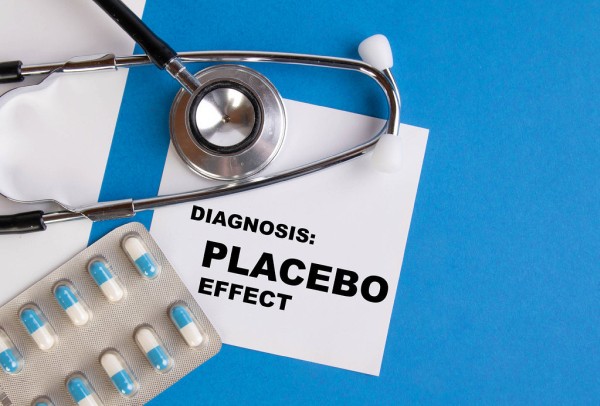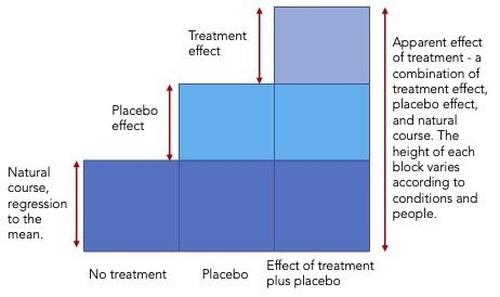The Placebo Effect
- Details
- Written by David R. Hamilton PhD

Forty patients with asthma, emphysema, or restrictive lung disease were given an inhaler that contained a nebulised saline placebo, but they were told that it contained allergens that would restrict their airways. It was a study conducted in the departments of psychiatry and medicine at the State University of New York.
Before long, 19 of the forty patients reacted with considerable constriction of their airways. Twelve of them, in fact, had an actual asthma attack.
They were then given a different inhaler and told it would relieve their symptoms. It did precisely that, yet it was also a saline placebo inhaler.
So the same placebo was able to either create or eliminate bronchospasm depending on what the patients believed it would do.
Similarly, the same placebo could induce or cancel pain, bring about or reduce nausea, or even act as a stimulant or a sedative, depending on what a person believed it was for.
Could an apple reduce pain? Chemically, perhaps not. But if someone believed it would then there’s a fair chance that they’d get at least some pain reduction.
How can this be so?
The placebo effect is the effect of belief or expectation on the brain or body. A placebo can be anything. It can be a tablet, injection, a food, an object, a device, a person, even a room. It can be facilitated by reassuring words: “This pill will do the trick. Don’t worry.” It can even be the context that something is given in.
A location that has a warm feeling and was adorned with complex named drugs or potions and where sat a doctor with a kind, reassuring smile, would help more people than a cold room with blank walls and a doctor with their back to the patient as they typed on a computer.
But it would be wrong to conclude that it’s all just in the mind and leave it at that, as if a reduction in pain or other symptoms was purely imaginary. Research shows that belief causes biochemical changes in the brain and body. An apple would reduce pain for someone if they believed it would because their belief would produce the brain’s own painkillers. They’re called endogenous opioids.
It’s the endogenous opioids that reduce the pain, not the apple, and it’s the belief that produces the endogenous opioids. That’s why it doesn’t matter all that much whether a person believes an apple, a pill, a complex looking piece of equipment, a sound, a smell, a location, or a person will reduce their pain. Here, objects and people are merely things we attach our beliefs to.
This doesn’t, of course, mean that everything is just placebo. The vast majority of medicines have a very real effect. As a former organic chemist, I can say that with some confidence. I have spent countless hours constructing molecules and then demonstrating what happens when those molecules interact with other substances.
In a basic sense, most schoolchildren will have observed an acid interacting with an alkali in a science lab to produce salt and water. Salt has a real taste that’s not all in the mind, although a belief could alter the intensity of it – making it appear more salty or less salty. Similarly, the interaction of ethanol (alcohol) with acetic acid (vinegar) produces a substance (known as an ester) whose smell we recognise as pear drops.
Taken a little further, interactions between several substances in a sequential manner, like adding Lego blocks together one-by-one, can produce medicines that reduce blood pressure, dissolve tumours, and do many more things. This is the field of science that I did my PhD in.
Generally speaking, it’s neither all about the drug or all placebo, but a bit of both. Sometimes it’s more of one and less of the other, and sometimes it’s more of the other and less of the one. But regardless, the context that something is offered in and the person’s beliefs about the thing have real effects.
The image below shows typical effects of no treatment, placebos, and treatment, which also contains a placebo effect.
 (c) Dr David R Hamilton
(c) Dr David R HamiltonMany conditions have a natural course, where the body will eventually heal by itself, usually when the immune system gets a hold on things. This is what the first column shows. A few decades ago, we used to believe that the placebo effect was just the natural course of things, but we now know that’s not the case.
The second column shows that there is a real effect of belief. Hidden within it is the natural course of a condition, but the placebo effect itself adds something significant.
And the third column shows the effect of the treatment given, and within this effect is also the impact of the placebo and the natural course of things. We usually attribute getting better all to the drug, but the other effects always play a role. The size of the role varies from one condition to the next.
So most medicines have a built in placebo effect because it’s impossible to remove the effects of the person’s belief about what they’re taking. A body of researchers now believe that we should look to use this placebo effect in clinical practice, not try to eliminate it, as it will almost always be to the patients’ benefit.
Giving a person a positive perception of a treatment or outcome can really matter.
Perception
Any way of creating or altering a perception can cause a placebo effect. In a study at Keele University in the UK, 835 women with recurring headaches were given one of four types of tablet.
One group received a well-known branded aspirin tablet while a second group received the same aspirin but it came in cheaper packaging and was labelled ‘analgesic’, typical of a mass market generic brand. A third group received a placebo, but it was made to look like the branded aspirin, and a fourth group received a placebo that was labelled ‘analgesic’.
It turned out that the perception of the branding made quite a difference. The branded aspirin worked better than the generic aspirin, but the branded placebo also worked better than then ‘generic’ placebo, even though they were both placebos. And the branded placebo was almost as good as the generic aspirin.
Branding mattered because of what it meant. A well-known brand confers the idea of quality, and this perception generated some endogenous opioids that gave the branded aspirin a little boost over the generic one.
Perception of the type of treatment matters too. In a US study of migraine treatments, placebo injections were found to be 50 percent better than placebo tablets, yet a European study found that placebo tablets were 10 percent better than placebo injections. There was no flaw in how the studies were carried out. It mostly just comes down to language and culture. In the UK, we speak of ‘popping pills’, but in the US, people place more faith in ‘getting a shot’. The studies show that it comes down to what we have most faith in.
And perception of a doctor or physician makes a difference. The same doctor could treat two groups of patients but dress and communicate differently. For one group, he could make himself look a little older, dress smartly, wear glasses, and show care for the patient. For the other group, he could make himself look younger, dress a little dishevelled, and behave in a disinterested way. The clinical outcome in the first group would typically be better. Why? Because of the patients’ perception of the doctor.
Remember to take all your placebos
We’ve all heard doctors remind us that we must take the full course of our treatments. It turns out that we also need to take all our placebos. Data from the Coronary Drug project in the US, that involved the cholesterol lowering drug, clofibrate, showed that the five-year survival rate for patients who took the full course of their placebos was 85 per cent, but it was 72 percent for those who didn’t stick to the course.
And studies show that four placebos work better than two placebos. For example, over 79 clinical trials of anti-ulcer drugs, the ulcer healed in 44 percent of patients who took four placebos a day, but only in 36 percent of people who took two placebos a day.
So the placebo effect is not all in the mind. It is, in a sense, but what’s in the mind then causes changes in the brain and body that depend upon what is in the mind.
For me, the placebo effect is a reminder that the mind can exert an important effect on the body. From my experience, there’s lots of ways to use our minds to positively affect our health, but I’d like to finish this piece by suggesting one of the simplest and most effective ones. It’s simply to think kindly of people.
That’s all.
David R. Hamilton PhD Now a bestselling author of 6 books published by Hay House, he offers talks and workshops that fuse science, the mind, and spiritual wisdom. David writes a regular blog for the Huffington Post. Source Here
After completing his PhD, David worked for 4 years in the pharmaceutical industry developing drugs for cardiovascular disease and cancer. During this time he also served as an athletics coach and manager of one of the UK’s largest athletics clubs, leading them to three successive UK finals. Upon leaving the pharmaceutical industry, David co-founded the international relief charity Spirit Aid Foundation and served as a director for 2 years.
© 2022 crystalwind.ca. All rights reserved.
Liked this article? Dive deeper into personal growth and wellness! Check out CrystalWind.ca for spiritual wisdom or explore AromaWorx.ca for natural well-being tips. Spread the positivity—share this with friends on their happiness journey!
Let’s Chat! Drop Your Thoughts Below! ![]()
Latest Articles

Imagine a world of inspiration and healing, free for all—made possible by YOU!
Donate Now—Ignite the Magic at CrystalWind.ca!

Epilepsy - Finding A Cure
Your donation can make a difference!
Help us find a cure – donate now!
Unlock Your Light: Join Lightworkers Worldwide on CrystalWind.ca!
Follow Us!
Featured This Month
Egyptian Zodiac/Astrology
Egyptian astrology was one of the earliest forms of astrology. The Egyptians w... Read more
Abalone Shell
Echos Of The Ancestors Abalone strengthens the structure of the body and th... Read more
Cancer Mythology
The Mythology of Cancer: A Celestial Tale of Loyalty and Sacrifice Among th... Read more
Chalcedony
The Stone Of Orators Chalcedony was very popular as a decorative stone in ant... Read more
Sun in Cancer
Cancer Sun Sign Characteristics Overview The name "Cancer" comes from Latin, ... Read more
Lammas by The Hedgewitch
Although in the heat of a Mid-western summer it might be difficult to discer... Read more
Lugh - Celtic God Of The Sun
The god Lugh was worshiped in Ireland as a deity of the sun. This connection... Read more






























































































































































